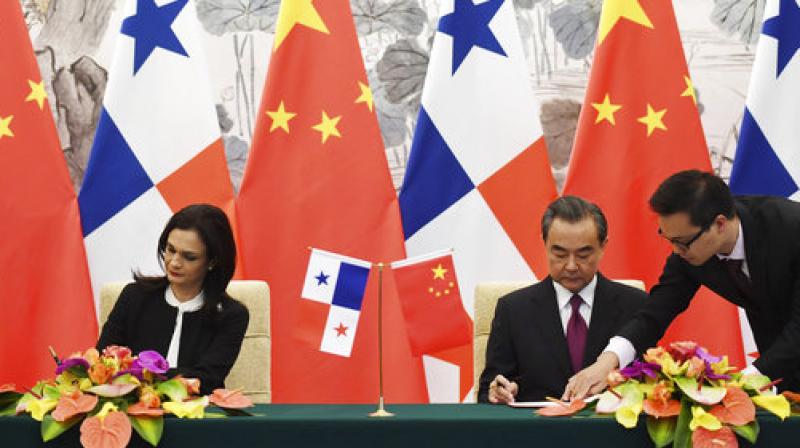Panama cuts ties with Taiwan, switches to China
Taiwan is recognised by around 20 countries worldwide and its status is one of the most politically sensitive issues for Chinese leaders

Beijing: Panama and China announced on Tuesday they were establishing diplomatic relations, as the Central American nation became the latest to dump Taiwan for closer ties with the world's second-largest economy.
The move prompted an angry response from Taiwan and will likely further strain ties between Taipei and Beijing, which considers the self-ruled island a renegade province awaiting reunification with the mainland.
Taiwan is recognised by around 20 countries worldwide and its status is one of the most politically sensitive issues for Chinese leaders who pressure trade partners to accept its "one China" principle.
Panamanian President Juan Carlos Varela said in a nationally televised message "to the country and the world" that "Panama and China establish diplomatic relations today".
The two countries issued a joint statement saying "In light of the interests and wishes of both peoples, the Republic of Panama and People's Republic of China have decided to grant each other, from the date of this document's signing, mutual recognition, establishment of diplomatic ties at the ambassadorial level."
After decades of siding with Taiwan in the disagreement over its status, Panama now "recognises that there is only one China in the world" and that Taiwan is part of Chinese territory.
Chinese Foreign Minister Wang Yi and his Panamanian counterpart Isabel Saint Malo de Alvarado signed the communique in Beijing. "This is a historic moment, China-Panama relations have opened a new chapter," Wang said, adding that Panama's decision was in "complete accordance" with its people's interests and "in keeping with the times".
Saint Malo said Panama and China had made an "important step" and started a "new page in our strategic relations" The announcement comes after Beijing began construction last week of a container port, with natural gas facilities, in Panama's northern province of Colon.
Panama had long stressed it had diplomatic ties with Taipei and commercial ones with Beijing. Chinese ships, after those from the United States, are the number two users of the Panama Canal, the Central American country's main source of budget revenue.
Panama is the latest country to cut ties with Taiwan and it is unlikely to be the last, said Carl Thayer, an emeritus professor of politics at the UNSW Canberra college in Australia. "That change is representing a longer term trend of atomic decay where the circle of countries that recognise Taiwan one by one seem to be shifting to the mainland," Thayer said.
"It's about who can give the most Taiwan has resources but it can't match China." In December China signed an agreement to restore diplomatic relations with Sao Tome and Principe after the African nation ditched the island.
Taiwan reacted furiously to the latest move. "We strongly condemn Beijing for manipulating the so- called 'one China' policy to continue to suppress Taiwan's
international space through various means," the presidential office said. "This kind of action is not only an open threat to Taiwanese people's survival and welfare but also an open provocation to peace and stability in the Taiwan strait and the region."
Diplomatic tussles between Taiwan and Beijing eased under the island's previous Beijing-friendly government. But relations have deteriorated since President Tsai Ing-wen's China-sceptic Democratic Progressive Party was swept to power in a landslide election victory last year.
Tsai has refused to acknowledge the concept that Taiwan is part of "one China", unlike her predecessor Ma Ying-jeou.

